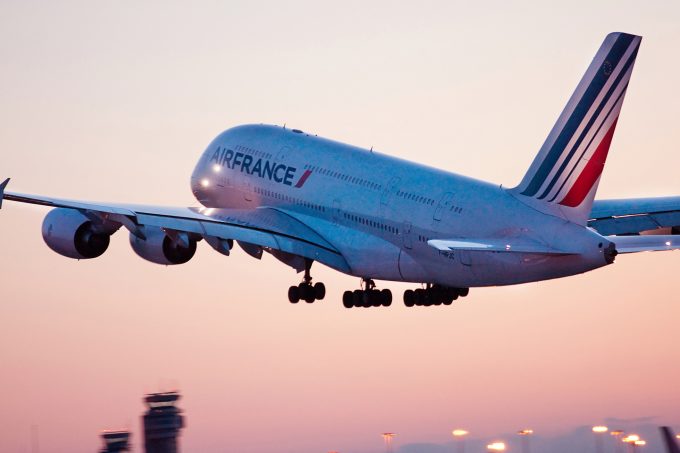Departing CFO claims Freightos will see profit in 2026 after reporting Q3 loss
UPDATED 28.11.24 TO INCLUDE FREIGHTOS INPUT AND REMOVE REFERENCE TO GUILLAUME HALLEUX Freightos’ share price fell ...
F: MAKING MONEY IN CHINAMAERSK: THE DAY AFTERDHL: NEW DEALGXO: NEW PARTNERSHIPKNIN: MATCHING PREVIOUS LOWSEXPD: VALUE AND LEGAL RISKMAERSK: DOWN SHE GOESVW: PAY CUTFDX: INSIDER BUYXOM: THE PAIN IS FELTUPS: CLOSING DEALSGXO: LOOKING FOR VALUE
F: MAKING MONEY IN CHINAMAERSK: THE DAY AFTERDHL: NEW DEALGXO: NEW PARTNERSHIPKNIN: MATCHING PREVIOUS LOWSEXPD: VALUE AND LEGAL RISKMAERSK: DOWN SHE GOESVW: PAY CUTFDX: INSIDER BUYXOM: THE PAIN IS FELTUPS: CLOSING DEALSGXO: LOOKING FOR VALUE

Air France-KLM is still operating under great financial pressure, in spite of a decent trading update this week, particularly if oil prices keep rising and costs are not carefully managed over the next couple of years.
Its shares plunged more than 4% on Wednesday, in the wake of a quarterly release that turned out to be worse than it looked at first sight, and its valuation was still under pressure yesterday, underperforming a flat stock market by two percentage points.
Share price movements say it all, really – but just how bad was its first-quarter release?
Let’s look at fundamentals.
Macroeconomic risk
Chief executive Jean-Marc Janaillac is set to take the helm of France’s flagship carrier by 31 July. He’ll soon have to address the relationships with the trade unions, based on the fact that salaries and related costs could become unsustainable over time, particularly if oil prices – which might have bottomed out earlier this year – continue to surge from their current level of around $45 a barrel.
On this front, several headlines have become less reassuring, although geopolitical risk is still manageable and the financial world currently seems to consider the imbalance between supply and demand as a much smaller problem than in the past few months. In this context, the board of Air France-KLM must pay attention to how macroeconomic events pan out, given that cost-cutting measures will unlikely be easy to execute due to sour relationships with the unions.
An announcement yesterday that Air France is cutting pilots’ pay from June 1 is unlikely to go down well.
Strained relationships with the unions were behind the departure of Alexandre de Juniac, who led AF-KLM through turbulent times, during which he prevented a likely highly dilutive cash call, helped by rapidly falling oil prices.
Cash flows
In its quarterly update, AF-KLM highlighted trends for earnings before interest taxes depreciation amortisation and rents (Ebitdar), which is on its way up – it reported “Ebitdar of €531m, an improvement of €307m and up €371m like-for-like.”
Ebitdar provides a good indication for the amount of adjusted operating cash flow that AF-KLM generates, and is a particularly important value driver because its net debt still stands at €4.1bn, having fallen only €146m year-on-year. On the bright side, its free cash flow profile is now positive to the tune of €196m, versus -€46m one year earlier, but funding requirements could swiftly change.
At a time when the domestic banking system is in flux, and many lenders cautiously gauge exposure and credit risk associated with cyclical businesses such as airlines, its quarterly revenues were flat, excluding currency adjustments – not necessarily a very bad performance.
However, as it says, a high level of uncertainty regarding fuel prices and unit revenues persists, “due to [the] geopolitical context and industry capacity environment”.
“Impact of fuel savings on P&L [are] expected to be significantly offset in the coming quarters by downward pressure on unit revenue and negative currency impacts,” AF-KLM also noted this week.
Its financial performance is slowly getting back on track, with the passenger business holding up relatively well, but cargo remains under pressure – things are much worse at Lufthansa, by the way – while the maintenance business and Transavia delivered the strongest financial performances.
Our focus, however, remains on its cost base.
Costs
Total operating costs were 4.9% lower year-on-year and down 7.6% on a like-for-like basis but “ex-fuel, they increased by 2% and by 0.3% on a like-for-like basis.” Like-for-like figures exclude the impact of currency changes.
AF-KLM saved $384m quarterly at operating level due to lower fuel costs, down to €1.1bn from almost €1.5bn year-on-year, as the table below shows.
Chartering costs, landing fees and en route charges, catering and a few other operating expenses are all essentially unchanged, but salaries, its biggest cost, rose 1% to €1.84bn, totalling almost 33% of group revenues (€5.6bn).
Higher fuel savings more than made up for its Ebitdar improvement (€307m), and that also shows in its bottom line, with net income at -€155 versus -$559m one year earlier, as well as in its gross cash balances, which rose to €3.5bn from €3.1bn at the end of 2015.
Its gross debt pile is essentially flat year-on-year and still amounts to almost €9bn, with €2bn due within 12 months.
AF-KLM is better managing working capital, particularly receivables and payables cycles. These elements, however, could indicate that it is preparing for tougher trading conditions, which will likely reverberate on the performance of its European rival, Lufthansa, whose trading update this week left a bitter taste in the mouth of investors.
Units
A more granular look at its financials indicates that cargo operations, which will soon be led by a new chief executive, are still troubled, although the quarterly performance wasn’t too different for that of its rivals.
Low-cost carrier Transavia is growing and is the star performer, while the maintenance business is faring well. Finally, KLM is faring better than Air France.
Which will likely reignite the ever-going Franco-Dutch debate on whether costs should be targeted at the French operations in an environment where oil prices might continue to rise.
Comment on this article